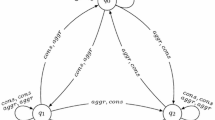Abstract
Design and control of multi-agent systems correspond to the synthesis of winning strategies in games that model the interaction between the agents. In games with full observability, the strategies of players depend on the full history of the play. In games with partial observability, strategies depend only on observable components of the history. We survey two approaches to partial observability in two-player turn-based games with behavioral winning conditions. The first is the traditional longitudinal observability, where in all vertices, the players observe the assignment only to an observable subset of the atomic propositions. The second is the recently studied transverse observability, where players observe the assignment to all the atomic propositions, but only in vertices they own.
O.K—Supported in part by the Israel Science Foundation, grant No. 2357/19.
Access this chapter
Tax calculation will be finalised at checkout
Purchases are for personal use only
Similar content being viewed by others
Notes
- 1.
Note that memoryless strategies, which depend only on the current vertex of the game, are a special case of strategies with a transverse observability. Since, however, we consider here games with a behavioral winning condition, memoryless strategies are not sufficient. In contrast, in some games with a structural winning condition, say Büchi or parity, memoryless strategies are sufficient, and hence also ones with transverse observability.
- 2.
References
Agarwal, S., Kodialam, M.S., Lakshman, T.V.: Traffic engineering in software defined networks. In: Proceedings of the 32nd IEEE International Conference on Computer Communications, pp. 2211–2219 (2013)
Almagor, S., Avni, G., Kupferman, O.: Repairing multi-player games. In: Proceedings of the 26th International Conference on Concurrency Theory. LIPIcs, vol. 42, pp. 325–339 (2015)
Alur, R., Henzinger, T.A., Kupferman, O.: Alternating-time temporal logic. J. ACM 49(5), 672–713 (2002)
Chatterjee, K., Doyen, L.: The complexity of partial-observation parity games. In: Fermüller, C.G., Voronkov, A. (eds.) LPAR 2010. LNCS, vol. 6397, pp. 1–14. Springer, Heidelberg (2010). https://doi.org/10.1007/978-3-642-16242-8_1
Chatterjee, K., Doyen, L., Henzinger, T.A., Raskin, J.-F.: Algorithms for omega-regular games with imperfect information. In: Ésik, Z. (ed.) CSL 2006. LNCS, vol. 4207, pp. 287–302. Springer, Heidelberg (2006). https://doi.org/10.1007/11874683_19
Fisman, D., Kupferman, O.: Reasoning about finite-state switched systems. In: Namjoshi, K., Zeller, A., Ziv, A. (eds.) HVC 2009. LNCS, vol. 6405, pp. 71–86. Springer, Heidelberg (2011). https://doi.org/10.1007/978-3-642-19237-1_10
Gutierrez, J., Perelli, G., Wooldridge, M.J.: Imperfect information in reactive modules games. Inf. Comput. 261, 650–675 (2018)
Kupferman, O., Shenwald, N.: Perspective games with notifications. Submitted (2020)
Kupferman, O., Vardi, G.: Perspective games. In: Proceedings of the 34th IEEE Symposium on Logic in Computer Science, pp. 1–13 (2019)
Kupferman, O., Vardi, M.Y.: Synthesis with incomplete information. In: Advances in Temporal Logic, pp. 109–127. Kluwer Academic Publishers (2000)
Kupferman, O., Vardi, M.Y.: Safraless decision procedures. In: Proceedings of the 46th IEEE Symposium on Foundations of Computer Science, pp. 531–540 (2005)
Liberzon, D.: Switching in Systems and Control. Birkhauser, Boston (2003). https://doi.org/10.1007/978-1-4612-0017-8
Lustig, Y., Vardi, M.Y.: Synthesis from component libraries. Softw. Tools Technol. Transf. 15(5–6), 603–618 (2013)
Margaliot, M.: Stability analysis of switched systems using variational principles: an introduction. Automatica 42(12), 2059–2077 (2006)
Pnueli, A., Rosner, R.: On the synthesis of an asynchronous reactive module. In: Ausiello, G., Dezani-Ciancaglini, M., Della Rocca, S.R. (eds.) ICALP 1989. LNCS, vol. 372, pp. 652–671. Springer, Heidelberg (1989). https://doi.org/10.1007/BFb0035790
Puchala, B.: Asynchronous omega-regular games with partial information. In: Hliněný, P., Kučera, A. (eds.) MFCS 2010. LNCS, vol. 6281, pp. 592–603. Springer, Heidelberg (2010). https://doi.org/10.1007/978-3-642-15155-2_52
Reif, J.H.: The complexity of two-player games of incomplete information. J. Comput. Syst. Sci. 29, 274–301 (1984)
Vardi, M.Y., Wolper, P.: Yet another process logic. In: Clarke, E., Kozen, D. (eds.) Logic of Programs 1983. LNCS, vol. 164, pp. 501–512. Springer, Heidelberg (1984). https://doi.org/10.1007/3-540-12896-4_383
Vardi, M.Y., Wolper, P.: Automata-theoretic techniques for modal logics of programs. J. Comput. Syst. Sci. 32(2), 182–221 (1986)
Author information
Authors and Affiliations
Corresponding author
Editor information
Editors and Affiliations
Rights and permissions
Copyright information
© 2020 Springer Nature Switzerland AG
About this paper
Cite this paper
Kupferman, O. (2020). Games with Full, Longitudinal, and Transverse Observability. In: Schmitz, S., Potapov, I. (eds) Reachability Problems. RP 2020. Lecture Notes in Computer Science(), vol 12448. Springer, Cham. https://doi.org/10.1007/978-3-030-61739-4_2
Download citation
DOI: https://doi.org/10.1007/978-3-030-61739-4_2
Published:
Publisher Name: Springer, Cham
Print ISBN: 978-3-030-61738-7
Online ISBN: 978-3-030-61739-4
eBook Packages: Computer ScienceComputer Science (R0)




